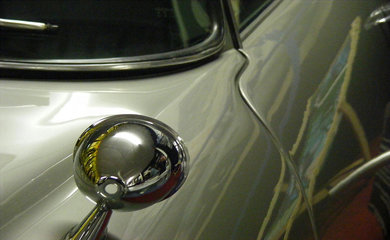SPECTRE opens in a burst of colour and noise on the streets of Mexico City as James Bond fights his way through crowds of Day of the Dead celebrants and into the customary attempted assassination/explosion sequence that leads nearly every Bond film. As viewers, we know what to expect: Fast cars, beautiful women, glorious explosions, shaken not stirred, fine guns, a venerable franchise that’s famous around the world. SPECTRE wasn’t greeted with much enthusiasm, though, including from its own star, who went on multiple bitter rants during its publicity blitz to the effect that he thinks the franchise is outdated, misogynistic, and tarnished—of course, he already knew that he wouldn’t be coming back.
Craig’s ‘good riddance to bad rubbish’ stance on Bond encapsulates the larger question and problem of the whole franchise. Bond could indeed be yet another misogynistic, outdated, Jurassic series of spy movies with handsome men romancing svelte women and taking breaks for the occasional exchange of gunfire. Or it could be a brilliant satire of itself and the whole genre—or it might have transitioned to a satirical artform over the years.
Ian Fleming likely didn’t intend it as such. The former naval intelligence officer was, by all accounts, very much a Connery Bond—misogynistic, simplistic in his attempts to brutalise his way through intelligence challenges, under mistaken impressions of his own degree of savoir faire. Fleming’s novels and subsequent film versions underwent a surprising amount of success, and the franchise has evolved considerably over the years, especially under Craig’s tenure. His films, designed to play as a prequel to the older films (if Star Wars is doing it, so can everyone else), depict a darker, more thoughtful Bond, one slowly growing hardened by his profession rather than one too far gone to care.
In the Bond mythology, SPECTRE plays an important role, providing viewers with the backstory for Ernst Stavro Blofeld, one of the most iconic villains of the series. The wheelchair user (and notable cat owner) appeared in multiple Bond films and he’s been satirized on countless occasions. SPECTRE casts Bond as the cuckoo in Blofeld’s nest, in a bizarre act of retconning that draws upon an eclectic assortment of names and stories from the series (which at times can’t seem to decide if 007 is a number or a title, if Bond is one man or a series of men, if any continuity at all is required). We learn that Blofeld resents Bond for stealing the affections of his father, but SPECTRE also explains the nature of his acquired injuries, seating him firmly in the viewer mindset as a bitter cripple.
What’s interesting about Blofeld, though, is that he can’t be written off as a stereotyped bitter cripple and left at that. His attempt at controlling the world through information gathering and surveillance—a heavy theme in the film, which plays at the idea of the security state and constant oversight—begins before his injuries and so does his specific hatred of Bond, rooted as it is in his childhood. Oddly, one of the more nuanced depictions of a wheelchair user in modern film occurs in the context of an action franchise heavily criticised for being somewhat lacking in the sensitivity and social justice department, which speaks to the complicated relationship Bond has to viewers and with itself, teetering between self-aware mockery of its entire genre and a firmly-seated place within the action pantheon.
It’s a pity that SPECTRE itself wasn’t more engaging. It’s far from the worst Bond film—You Only Live Twice certainly comes to mind—but it wasn’t the best, either, and it certainly marked a low point for Craig, who was spectacular in Skyfall. The film, perhaps humorously, suffered from the irritating trait of extensive monologing on the part of the villains as they painstakingly spelled out their schemes—exactly the sort of scenery-chewing people assign to the stereotypical ‘Bond villain.’ (They do seem oddly and somewhat charmingly clueness when it comes to disclosing the entirety of their plans under the mistaken impression that Bond won’t somehow escape and use them against them.)
For all the beautiful destinations in the film, SPECTRE also lacked coherent threading from scene to scene. The generic plot could be summed up quite minimally—the 00 programme is under threat, Bond has gone rogue, etc—and the film bounces about from place to place and explosion to explosion somewhat purposelessly. Even Bond’s notorious multiple liaisons feel a little pro forma, as though the filmmakers felt required to show them, but had run out of interest or taste for them. Bond and Madeleine (Leá Seydoux) lacked the dynamic intensity seen with the character and many of his other counterparts, and they really didn’t mesh in the way that he’s connected with the handful of women he pursued long term relationships and marriage—yes, I remember On Her Majesty’s Secret Service—with. Their chemistry with each other didn’t seem like the fire that would drive him away from the intelligence community and into her arms forever, pushing him to choose love over duty.
SPECTRE may mark an important turning point as the reception of the film provides a testing ground to determine if the series has run its course. In an era when flogging franchises to death has become the norm and convincing studios that it’s time to put beloved properties to rest is a challenge, Bond may be facing a depressing future as a franchise slowly beaten into the ground, rather than one allowed to either evolve or die peacefully.
Photo by Dave McLear, licensed under a Creative Commons Attribution 2.0 Generic license

